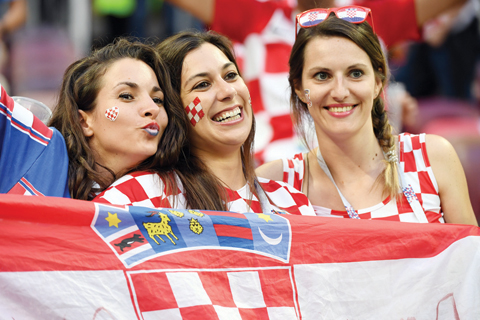
MOSCOW: File photo shows Croatia fans cheer before the Russia 2018 World Cup semi-final football match between Croatia and England at the Luzhniki Stadium in Moscow on July 11, 2018. - AFP
KUWAIT: When France plays Croatia in the World Cup final on Sunday, they will have a significant but often overlooked advantage. Croatia will go into the match against France with 24 hours less time to rest due to the fact that they played their semifinal game one day after the French faced Belgium. The calendar of the World Cup competition gives a major advantage to one of the semifinalists. An extra 24 hours of rest becomes even more of a factor when you have only three or four days between matches.
The lost day of rest isn't Croatia's only disadvantage: The Croatian players, led by Zlatko Dalic, are also coming into the final having recently played an exhausting semifinal match against England. In that semifinal, they played two halves of extra time. And in the previous game, the Croatians played a fatiguing match in the quarterfinals against the Russians. In that game, extra time was followed by the emotional burden of penalty kicks.
It should be noted that the Russian squad in this tournament has been in possession of astounding levels of fitness. Hence, the Croatians had to pull everything from deep inside the gas tank. As a result, several Croatian players seemed physically battered after the hard-fought duel.
Making the disparity worse still is the fact that in all their matches, the French have not played a single bout of extra time. Consequently, they have been able to conserve energy and move into the final game with considerable capital.
It will clearly be a huge challenge for Croatia to recover in time to play with the energy and vitality necessary to win. They will definitely need the encouragement of the thousands of Croatian fans who have inundated Moscow.
France's physiological edge may also confer a psychological advantage in that match. In the backs of their minds, the Croatians will know that they may be entering the game with less fuel in the tank, and having those thoughts won't help, especially in a game of this magnitude-one that surely will be the most important in these players' lives.
But we must note that there is a trait of the utmost importance in sports that is often overlooked. Will, or the psychological fortitude of any given team or player, is one of the most difficult and least quantifiable elements in sports. Football experts, pundits and statisticians often consider several elements related to the game, such as individual talent, technique, fitness and tactical prowess, but many observers let will slip by unnoticed, perhaps because this attribute is usually observed only in times of tribulation, defeat or extreme adversity-that is, when a team is losing.
Yet the Croatians showed plenty of blood, sweat and tears when they faced England. Their mental fortitude was apparent even with a fresher England that had not played an extra set of overtime in their previous match. The main question we have to ask is how they were able to show so much grit against England. In answering that question, we have to go back to history.
It may be worthwhile to note the traumatic recent history of the Croatian people: Their unity may have been forged from the bloody conflict that followed the collapse of Yugoslavia in the 1990s. Some players in the squad directly faced the brunt of that trauma. Undoubtedly, events such as these can galvanize a group of united men to accomplish extraordinary feats.
If in the final, the Croatian team is able to once again muster this psychological strength to offset the dramatic physiological disadvantage that they face, it would be simply mind boggling. They have already defied the odds against England. The island should have had a physical advantage, since they had not played overtime just before that encounter.
But the odds against France are of a significantly higher magnitude. It would take a gargantuan effort by the Croatians to win the final. France is significantly better than England in all aspects of match play. They are more organized tactically, and in all positions, their players' individual skills exceed those of their English counterparts. Furthermore, they will benefit from the physiological advantage we discussed-an extra day of rest and being spared any extra-time play.
It is evident that both teams have made use of many schemes and of even more complex strategies to shorten their recovery time. However, the success of these strategies depends on how organized, committed and persistent the staff of a team is in mobilizing them.
In fact, even if the Croatians use all these strategies, we still cannot be sure they will have adequate time to fully recover, especially given the toll taken by all the other tough matches they have played throughout the tournament. The trauma to physiological systems and subsystems may be too overwhelming for them to come through again.
If Croatia wins, it would defy well-established notions within the field of exercise physiology. Moreover, there is no precedent, at least in World Cup competition, of a team reaching the finals and winning after playing three bouts of overtime in their previous matches.
But then again, its one game, and we cannot be sure that the French will show up in full force for the encounter. Let's not forget that they flopped in the final of the Euro against Portugal. And strange things happen in the game of football. Sometimes unknown forces affect the game, and randomness is all around us. Black swan events do happen; Croatia may yet have us all running off to read Nassim Nicholas Taleb. Last but not least, an emotionally resilient mind can accomplish great feats. If the beast mode within the Croatian spirit is let loose once again, France had better watch out.
By Ricardo Guerra










